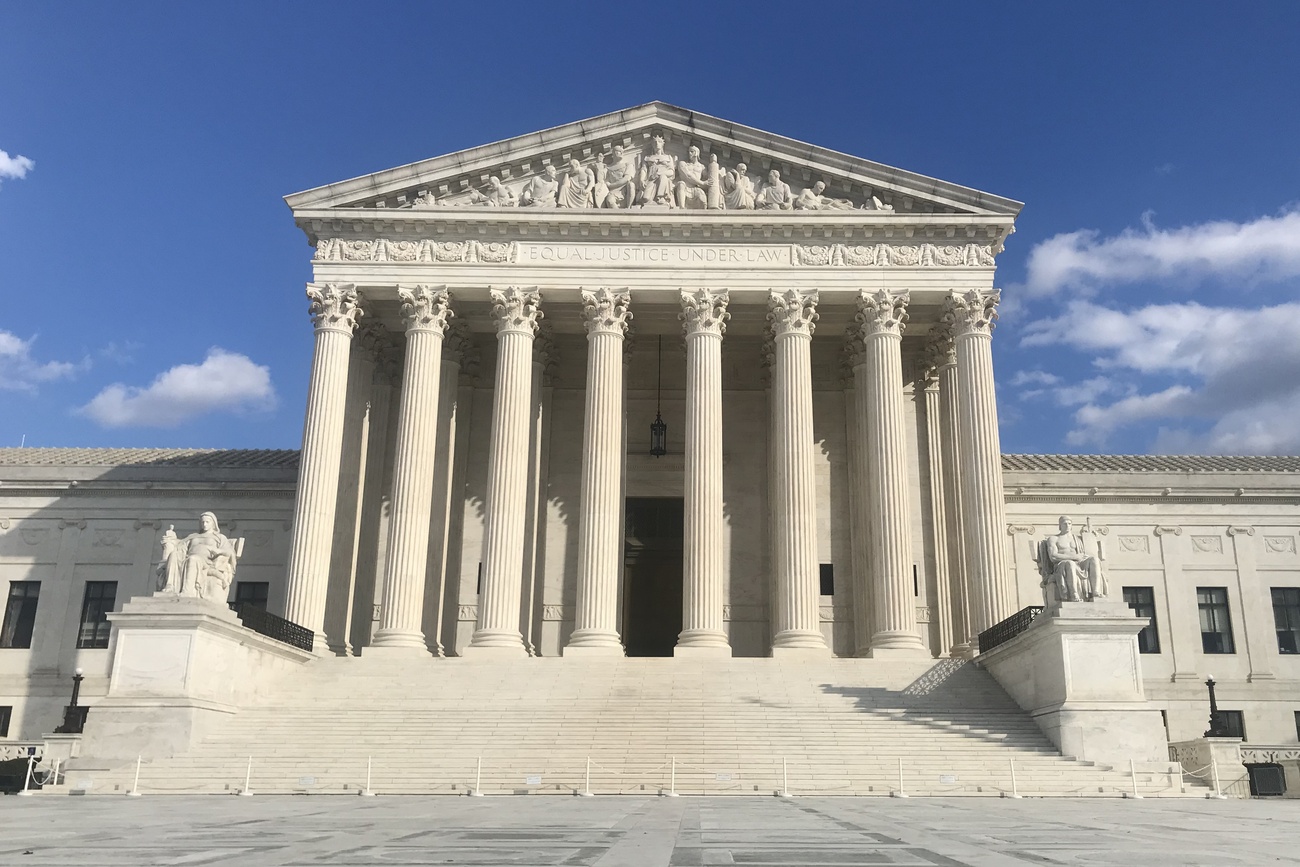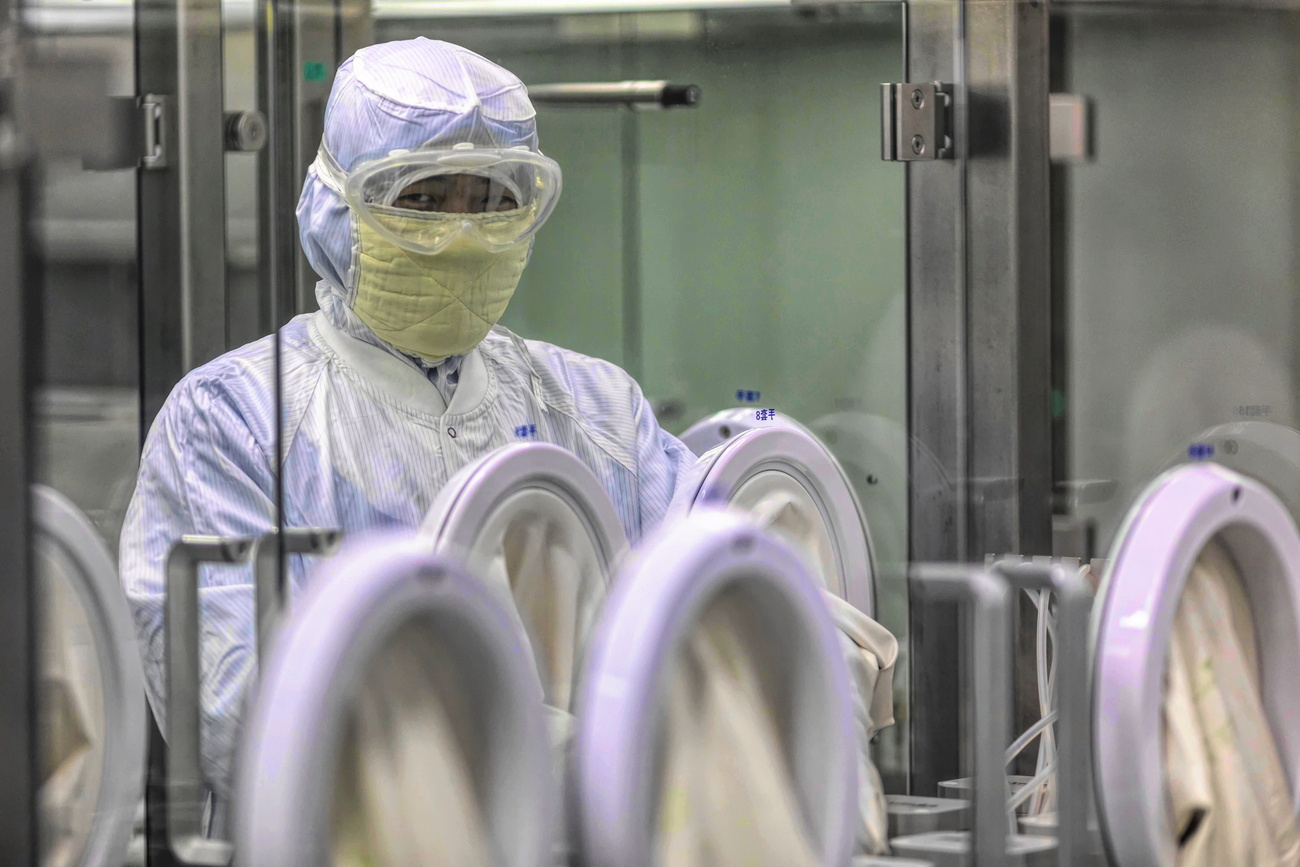
Anti-Trump protests, taking tariffs to court, and US funding cuts for science

Welcome to our press review of events in the United States. Every Wednesday we look at how the Swiss media have reported and reacted to three major stories in the US – in politics, finance and science.
Would you like to receive the newsletter delivered directly to your inbox? Subscribe here.
It was quite a sight at the weekend, seeing millions of people across the United States protesting – peacefully and often with humour – against their president. Will the anti-Trump sentiment on display at the “No Kings” protests translate into electoral success for Democrats? We’ll know on November 4, when some states are holding elections for governor and state legislatures.
Also this week, we look at an entrepreneur in Illinois who has taken the government to the Supreme Court over tariffs, and how Europe should respond to the US’s decision to cut funding of international science research projects.

Millions of Americans took to the streets on Saturday to voice their opposition to President Donald Trump in a day of nationwide mobilisation.
Responding to a “No Kings” rallying cry, around seven million people marched to denounce the Republican president’s “authoritarian takeover”, organisers said, as reported by Swiss public television RTS. More than 2,700 rallies had been planned throughout the day, in major cities and rural towns, including near Trump’s Mar-a-Lago residence in Florida, where he was spending the weekend.
The Neue Zürcher Zeitung (NZZ) reported that in New York City, more than 100,000 people gathered in several places. Thousands of Trump opponents also took to the streets in Washington, Los Angeles, Pittsburgh, Boston, Chicago and Seattle. In many places demonstrators dressed up, sang songs together or carried colourful banners and posters to underline the peaceful nature of the protests.
Opponents accuse Trump of deliberately fuelling escalation and wanting to normalise the use of the military against dissenters, Swiss public television SRF explained. Several democratically governed cities and states are taking legal action against the deployment of the National Guard in their communities, it said.
“The US President is throwing the separation of powers out the window, turning the country into a casino economy and dismantling an already fragile healthcare system,” wrote Le Temps in Geneva in an editorial on Tuesday.
“Too alarmist? America’s gradual descent into Trumpian authoritarianism is a real danger. Without a strong and sustained response, American democracy as we have known it may not survive. The seven million demonstrators over the weekend are an initial response, but it’s still largely insufficient.”
- Le Temps editorialExternal link (French)
- Coverage of ‘No Kings’ demo – SRFExternal link and RTSExternal link (German, French)
- Further coverage by the Tages-AnzeigerExternal link, Neue Zürcher ZeitungExternal link and Blick (German)

The tariffs of the Trump administration are squeezing not only Swiss companies: many businesses in the US are also feeling the effects. But one entrepreneur has dared to take the government all the way to the Supreme Court.
Rick Woldenberg, 65, runs a “text-book family business”, as Swiss public television SRF reported on Wednesday. His parents founded it, he’s been running it for almost 30 years, and his wife and three grown-up children also work for it. His two companies, Learning Resources and hand2mind, manufacture and sell educational toys and have created 500 jobs.
But if nothing changes, it could soon be over. “The tariffs that Donald Trump has imposed are threatening our existence,” Woldenberg told SRF in his warehouse in Illinois. “It’s as if we’re simply burning a large part of our income.”
In the 1980s and 1990s, when Woldenberg’s parents expanded the company, they began to produce their goods in China. This proved successful for a long time. But then the Trump administration’s tariff policy changed everything. At times, US tariffs on Chinese imports have been as high as 145%. In May, the two governments agreed on a 90-day reduction to 30%. What happens next is unclear. On October 10, Trump announced he would increase tariffs on China by 100% from November 1.
Moving production to the US is not an option, he says. “What we sell wasn’t produced here before either. There’s no one who’d be able to do it.” But he refuses to give up. “If I don’t save our company, no one else will.” That’s why he is one of the few who has dared to take legal action against the government. At the end of April he filed a lawsuit in Washington, DC – and achieved his first success.
In May the district court judge ruled that the US President had exceeded his authority by going it alone: the constitution requires the approval of Congress for such drastic customs regulations.
Woldenberg’s case has been combined with a number of similar lawsuits. The Supreme Court will rule on the case next, with the hearing set for November 5. If it comes to the same conclusion as the district court, this could have global consequences – and potentially also ease the pressure on Swiss companies.
Trump has labelled the plaintiffs “enemies of the state” and has announced his intention to appear in the courtroom. “This lawsuit is not politically motivated,” Woldenberg says. “But we have to defend ourselves against what is happening here in the US right now.”

Studies, registers, databases – the United States has donated a lot to the world of science, but it no longer sees why it should bear the costs of research that benefits everyone. Europe needs to step up, argues the Neue Zürcher Zeitung (NZZ).
“Since Donald Trump and the Republicans took over the government in the US almost ten months ago, it’s become clear in science that the big brother can no longer be relied upon,” the NZZ wrote in an editorial on Wednesday. The US is cutting off funding for international studies, while scientific databases and biobanks fear that they will soon lose their main sponsor.
“Suddenly it becomes clear how much the Americans are paying for in research – and how comfortable European science has become in their slipstream. This means that Europeans must also learn to stand on their own two feet in medical research, take on more responsibility – and redefine their relationship with the US.”
The NZZ explained how in 2023 the US National Institutes of Health spent $34.6 billion (CHF27.5 billion) on health research, for example on an HIV vaccine, cancer or long Covid. The figure for the European Commission was $1.1 billion.
“It’s certainly the wrong reaction to be offended if the US now wants to take off its money trousers,” the NZZ wrote. “There are certainly reasons to criticise the country’s new research policy, but the fact that America no longer wants to pay for everything in other countries can hardly be held against it.”
This is more of a reason to ask ourselves critical questions, it said. “Why, for example, has Europe been so reluctant to fund important joint scientific endeavours?” Now should be the time, the NZZ concluded, to approach the Americans and offer them a share of the costs for medical archive PubMed and other databases. “That would only be fair and would smooth the waves.”
- ‘The Americans are being stingy in research – now Europe must take overExternal link’ – NZZ (German, paywall)
- Trump’s anti-science stance has initial consequences for SwitzerlandExternal link – Tages-Anzeiger, March 2025 (German)
The next edition of ‘Swiss views of US news’ will be published on Wednesday, October 29. See you then!
If you have any comments or feedback, email english@swissinfo.ch

More
Subscribe to the newsletter “Swiss views of US news”
Stay informed with our weekly newsletter!
Are you looking for a simple way to stay updated on US-related news from a Swiss perspective?
Subscribe to our free weekly newsletter and receive concise summaries of the most important political, financial, and scientific stories in the United States, as reported by Switzerland’s leading media outlets – delivered straight to your inbox.
👉Sign up by entering your email address in the form below!

In compliance with the JTI standards
More: SWI swissinfo.ch certified by the Journalism Trust Initiative



























You can find an overview of ongoing debates with our journalists here . Please join us!
If you want to start a conversation about a topic raised in this article or want to report factual errors, email us at english@swissinfo.ch.